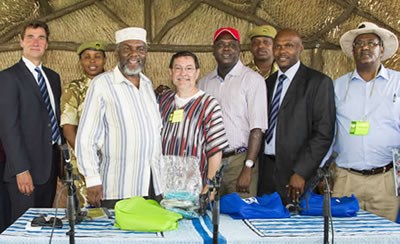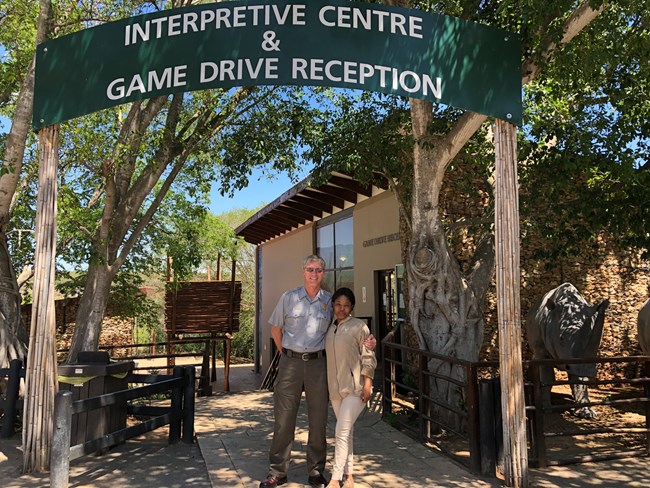The National Park Service's Office of International Affairs is going places. We're working with our parks and partners to increase environmental and cultural awareness throughout the world. We're involved with a lot of different countries and issues, but our main program areas include:

NPS Image
World Heritage
The World Heritage List includes over 1,000 places of such universal value that all of humanity has a stake in their preservation. The U.S. was a prime mover in the creation of the World Heritage Convention, which seeks to foster international cooperation to protect these globally significant sites. The Office of International Affairs tracks and reports on the status of the 26 current World Heritage sites, oversees the preparation of nominations for new U.S. proposals to the World Heritage List, maintains and updates the Tentative List for future nominations, represents the Department of the Interior at meetings of the UNESCO World Heritage Committee, and maintains contacts with colleagues around the world to share knowledge and best practices in management of these most important places.

NPS Image
International Volunteers in Parks Program
Every year, more than one hundred individuals from all over the world volunteer in the U.S.'s national parks. The International Volunteers-in-Parks Program (IVIP) benefits both the individual volunteer and the National Park Service: the volunteer receives training in park management, wildlife research, cultural resources, environmental education, etc., and the National Park Service gains a fresh perspective on park management in addition to assistance with carrying out the Service's mission.
The U.S. Department of State has designated the National Park Service as an official J-1 Exchange Program Sponsor. Parks are ideal places for IVIPs to experience the best that U.S. has to offer, to learn about American culture, and to share their own with park staff. The State Department’s intent for the J-1 visa program is for “exchange visitors” to return to their countries to teach others what they have learned. In this way, IVIPs help the National Park Service spread its mission around the world. Many former international volunteers have become conservation leaders, and they often reflect that their experiences volunteering in the national parks helped them in their future careers.
The National Park Service welcomes all who apply to the IVIP program, however it is primarily geared towards college students studying in a park related field or candidates who have the educational and professional backgrounds to benefit from the training that will learned during their program.

NPS Image
Sister Parks Program
It is widely accepted that most national parks are simply too small to fulfill their mission of preserving natural and cultural resources on their own. Park managers know that to fulfill their mandate, they cannot manage a protected area as an isolated island, but must seek opportunities to partner with neighboring land owners and the local community. There are benefits too, from gaining knowledge and lessons learned from other protected areas throughout the world.
With this in mind, some two dozen or more National Park Service sites have established "sister park" relationships in the last few years with national parks in other countries. These partnerships increase information sharing and direct park-to-park contacts to address many shared issues, primarily through improved telecommunications technologies.

NPS Image.
International Technical Assistance
The National Park Service conducts international technical assistance projects around the globe. Its overseas technical missions, demonstrates the full-range commitment of the Park Service in its contributions to global environmental conservation. The National Park Service's most successful exchange products and programs have been park planning assistance; program evaluation assistance; international training programs, including interpretive skills training and conferences, workshops, and symposia.
Congress and successive administrations have indicated that investments in U.S. national parks for preservation of wildlife values are incomplete unless we also invest in assuring that critical habitat is effectively protected in other countries to, and from, which the wildlife migrates. For example, money and time invested in training park rangers in Mexico, Central America, and the Caribbean are an investment to assure the preservation of park wildlife in National Park Service sites such as Everglades National Park. The international mission statement adopted by the National Park Service implies strong initiatives with our border nations. As a result, the Service cooperates with all of the U.S. border neighbors, including the Caribbean nations, Mexico, Canada, and the Russian Federation.

NPS image.
Learning from our Colleagues Abroad
“Travel is fatal to prejudice, bigotry, and narrow-mindedness, and many of our people need it sorely on these accounts.” - Mark TwainIn both the private and public sectors, leadership development initiatives increasingly recognize the importance of international engagement and awareness. As the world becomes ever more globalized and interconnected, it is critical that leaders have skills in cross-cultural awareness and the global context in which they operate.
Thanks to the generosity of an anonymous donor, The ‘Learning from Our Colleagues Abroad’ opportunity, which launched as a pilot program in 2017, provides travel support funds to qualified National Park Service field leaders (Superintendents and Deputy Superintendents) to facilitate 7-10 day study visits in foreign national parks or heritage sites. The National Park Service's Office of International Affairs, in partnership with the National Park Foundation, administers and funds the program.
Last updated: July 26, 2024
